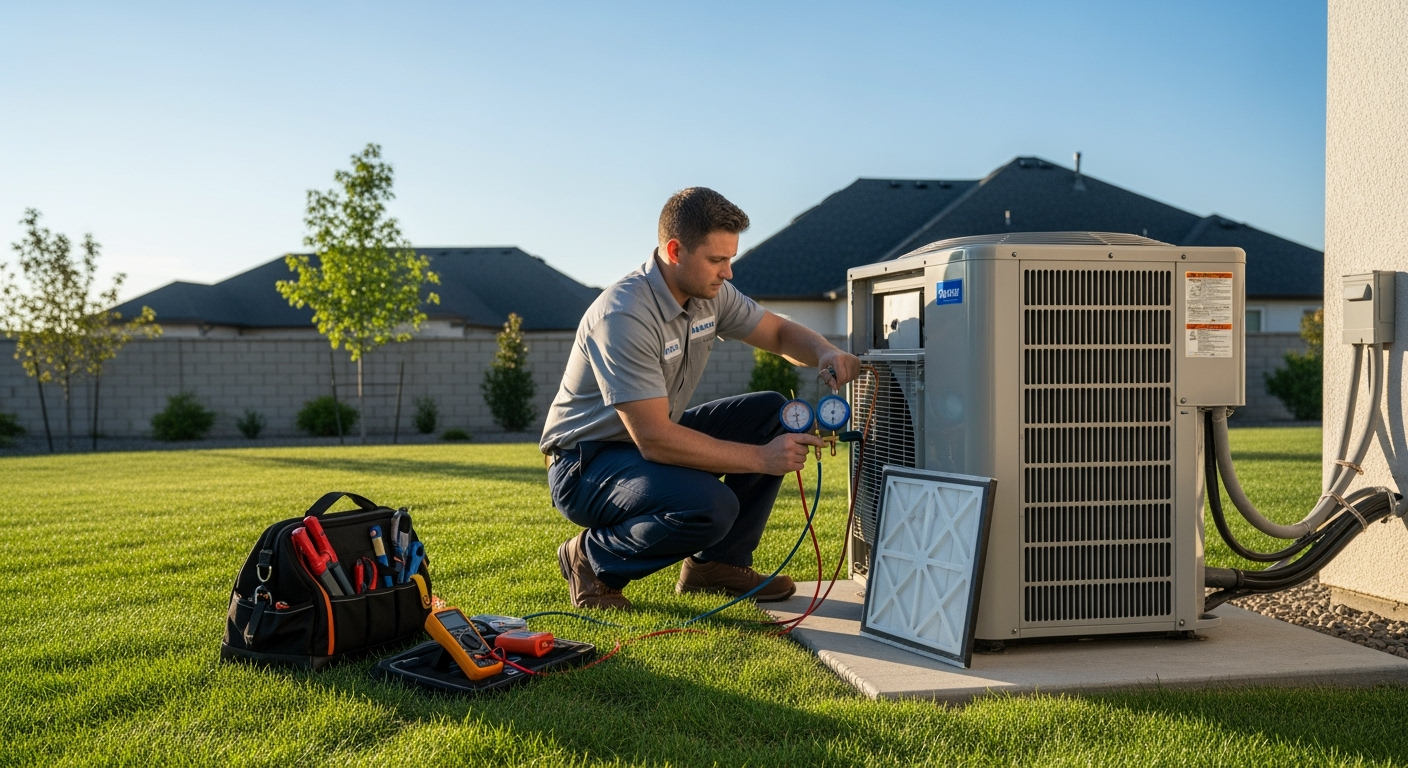What is Air Conditioning Maintenance?
Air conditioning maintenance encompasses all preventive care activities that keep your cooling system operating efficiently, safely, and reliably. Think of it like maintaining your car—regular oil changes and tune-ups prevent major engine repairs. Similarly, AC care involves cleaning, adjusting, lubricating, and inspecting components before minor issues require expensive HVAC repair services.
Proper air conditioning system care ensures optimal performance and longevity. Regular HVAC maintenance activities are crucial for effective cooling and energy efficiency.
Comprehensive care addresses three critical system areas: **mechanical components** (motors, fans, compressors), **electrical systems** (capacitors, contactors, wiring), and **refrigeration circuits** (coils, refrigerant, metering devices). Each area requires specific attention at different intervals, from simple monthly filter changes to annual professional HVAC service calls.
Regular air conditioning service can prevent costly repairs and enhance indoor comfort throughout Pennsylvania, New Jersey, and surrounding areas.
Professional HVAC maintenance significantly reduces common AC failures. According to Department of Energy guidelines, systems receiving regular service experience substantially fewer repair calls and maintain their efficiency throughout their lifespan, compared to neglected units that experience declining performance annually and require frequent repair work.
Investing in air conditioning care not only boosts efficiency but also prolongs the lifespan of your HVAC system.
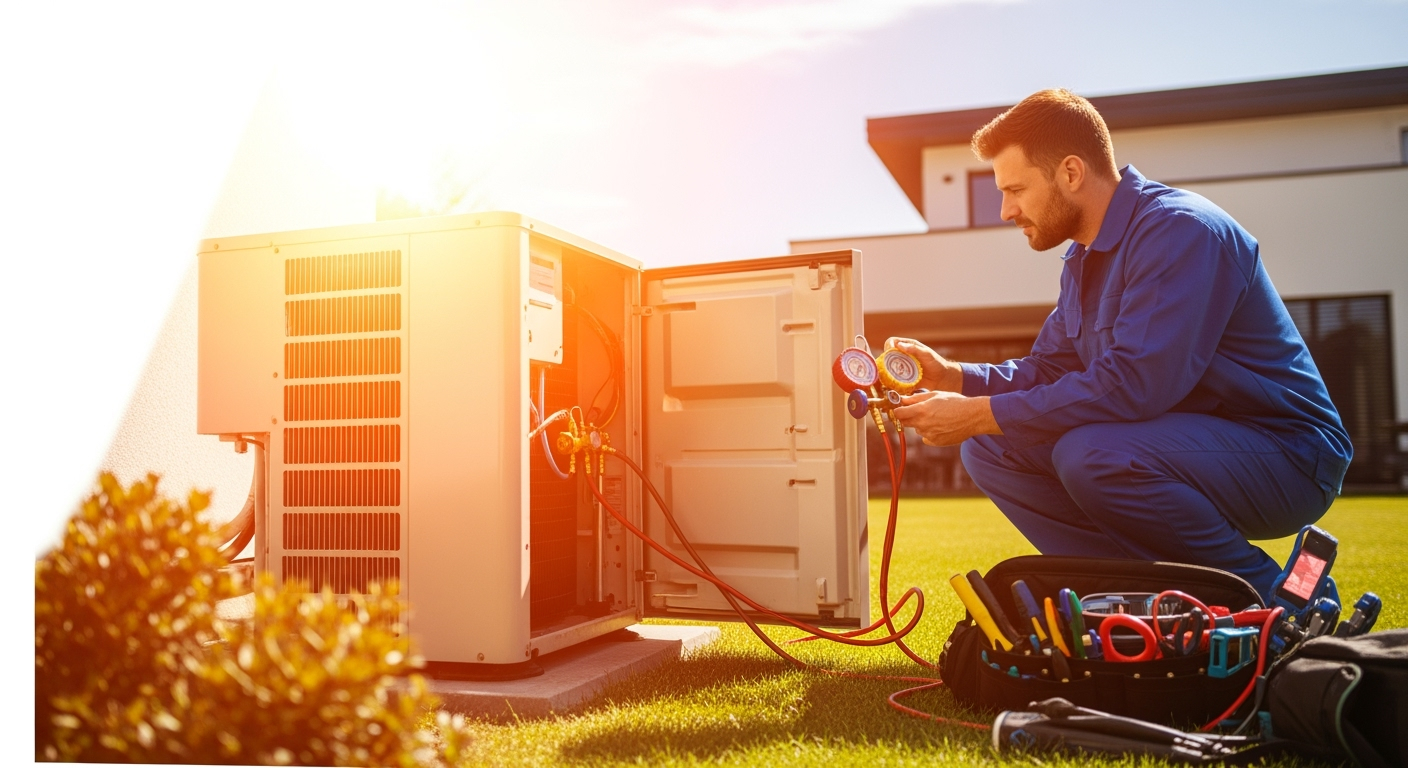
How Does Air Conditioning Work?
Understanding the importance of HVAC system care will help you recognize when professional repair services are needed.
Understanding your AC’s operation helps you recognize service needs and potential repair issues. Air conditioning systems don’t create cold air—they remove heat from indoor air through a continuous refrigeration cycle.
Regular HVAC service helps ensure that your cooling system operates effectively.
The Six-Step Cooling Process
1. **Heat New:** Warm indoor air passes over the evaporator coil containing cold refrigerant
2. **Heat Transfer:** Refrigerant absorbs heat and transforms from liquid to gas
3. **Compression:** The compressor pressurizes the gaseous refrigerant, raising its temperature
4. **Heat Rejection:** Hot refrigerant flows through the outdoor condenser coil, releasing heat outside
5. **Pressure Reduction:** Refrigerant passes through an expansion valve, cooling dramatically
6. **Cycle Repeat:** Cold refrigerant returns to the evaporator to absorb more heat
Following the six-step cooling process during HVAC service allows for efficient air conditioning operation.
💡 **Pro Tip:** Your AC removes humidity through condensation on the evaporator coil. A properly serviced system removes several pints of water hourly, requiring clear drainage paths to prevent water damage that needs repair. In humid Northeast regions like Philadelphia and Northern New Jersey, this drainage is especially critical during summer months.
Maintaining an efficient air conditioning system is essential for optimal humidity control and avoiding repair calls.
This continuous cycle operates for several minutes per cooling cycle under normal conditions. Short cycling (frequent on-off patterns) or continuous operation indicates service issues affecting system efficiency that may require an HVAC repair call. Homeowners from Trenton to Allentown often notice these patterns during humid summer months.
Types of Air Conditioning Systems
Each type of HVAC system has specific service needs that must be addressed for optimal performance and to avoid costly repairs.
Different AC system types require unique care approaches. Understanding your system type ensures appropriate service and maximum longevity before replacement installation becomes necessary.
Central Air Conditioning
Central HVAC systems serve entire homes through ductwork, consisting of outdoor condensing units and indoor air handlers or furnace-mounted evaporator coils. These systems represent the majority of residential cooling installations across the Mid-Atlantic region and require the most comprehensive service due to their complexity.
Central air conditioning service is vital to ensure proper airflow and prevent energy loss requiring repair.
Central systems need attention to ductwork integrity, which can significantly impact cooling efficiency. Leaky ducts waste substantial energy and introduce contaminants requiring professional mold remediation if moisture problems develop—call professionals immediately if you suspect issues in your Pennsylvania or New Jersey home.
Ductless Mini-Split Systems
Mini-splits provide zoned cooling without ductwork installation, featuring wall-mounted indoor units connected to outdoor compressors. These HVAC systems require unique filter cleaning every couple of weeks due to their exposed indoor location and continuous air circulation. They’re particularly popular in historic Philadelphia row homes and converted Bucks County barns where ductwork installation would be challenging.
Ductless systems require thorough conditioning service due to their unique setups and filtration systems—don’t delay necessary repair calls.
Each indoor unit needs individual care, making multi-zone systems more time-intensive. However, eliminating ductwork removes a major service concern while improving efficiency compared to ducted HVAC systems with typical leakage, according to Energy Department studies.
Window and Portable Units
Window unit air conditioning service involves regular filter cleaning and ensuring proper drainage to avoid repair needs.
Single-room cooling solutions require frequent filter cleaning due to direct exposure to room conditions. Window units need seasonal installation/removal and weatherization, while portable units require condensate tank emptying regularly during humid conditions—particularly important during New Jersey’s muggy summers when failure to do so may necessitate repair calls.
Understanding system type is essential for effective HVAC service planning. The key focus areas for air conditioning care include filters, coils, and overall system condition. Mini-split HVAC systems can significantly improve energy efficiency with proper service. Portable air conditioning units need consistent care to ensure efficiency and prevent repair issues during use.
| System Type | Service Frequency | Key Focus Areas | Typical Lifespan |
|---|---|---|---|
| Central AC | Monthly + Annual Pro Call | Filters, coils, ductwork | 15-20 years |
| Mini-Split | Bi-weekly + Annual HVAC Call | Indoor filters, drainage | 20-25 years |
| Window Unit | Weekly + Seasonal | Filter, chassis cleaning | 8-10 years |
| Portable AC | Daily + Weekly | Condensate, filters | 5-10 years |
Heat Pump Systems
Heat pump HVAC service requires attention to both cooling and heating functions to prevent repair needs.
Heat pumps provide both cooling and heating, requiring year-round service attention. Summer cooling care mirrors traditional AC requirements, but winter operation adds defrost cycle checks and reversing valve inspection. These dual-purpose HVAC systems experience **double the runtime hours** of cooling-only systems, necessitating more frequent service calls.
Benefits of Regular AC Service
Consistent HVAC service delivers measurable benefits beyond preventing breakdowns and repair calls. Understanding these advantages justifies the time and investment in proper system care.
Air conditioning service helps maintain energy efficiency, leading to lower utility bills and fewer repair expenses.
Energy Efficiency Optimization
Clean, well-serviced HVAC systems operate at peak efficiency, reducing energy consumption significantly. Dirty evaporator coils and clogged filters force systems to run longer cycles. According to ASHRAE standards, professional service includes efficiency testing that identifies problems before they require expensive repair work.
Regular air conditioning service can significantly enhance HVAC system performance and comfort throughout the Delaware Valley region.
Refrigerant charge optimization during service ensures proper heat transfer. Systems low on refrigerant consume more electricity while providing less cooling. Annual refrigerant checks prevent gradual efficiency losses from minor leaks that eventually require major repair calls.
Extended Equipment Lifespan
Long-term HVAC service greatly extends the lifespan of your cooling system before replacement installation is needed.
Regular care extends system life significantly. Well-serviced systems last considerably longer than neglected units requiring early replacement installation. Component-level benefits include extended compressor life, longer fan motor operation, and increased coil lifespan. Connecticut and Pennsylvania homeowners who maintain their systems properly often see equipment last well beyond manufacturer expectations.
Indoor Air Quality Enhancement
Your HVAC system filters thousands of cubic feet of air hourly, removing dust, pollen, and airborne contaminants. Proper service ensures effective filtration, preventing indoor air quality degradation that affects health and requires professional commercial air quality services in severe cases—call experts when needed.
Enhancing indoor air quality is a crucial benefit of regular air conditioning service, especially in urban areas like Newark and Philadelphia.
🏠 **Home Tip:** Mark filter change dates on your calendar. Consistent filter care alone can improve air quality and reduce airborne allergens significantly, preventing HVAC repair needs.
Warranty Protection
Most manufacturers require annual professional HVAC service calls to maintain warranty coverage. Skipping service voids warranties, potentially leaving you responsible for repairs typically covered. Documentation of regular service proves compliance during warranty claims after installation.
Essential Service Tasks and Schedules
Regular air conditioning care tasks can be easily incorporated into a homeowner’s routine between professional HVAC calls.
Effective AC care follows a structured schedule combining homeowner tasks with professional HVAC service. This systematic approach ensures nothing gets overlooked while maximizing system performance and minimizing repair needs.
Monthly Homeowner Tasks
Prioritizing air conditioning care helps identify issues before they require expensive repair calls.
**Filter inspection and replacement** tops the monthly list. Check filters every month, replacing when visibly dirty or according to manufacturer specifications. Homes with pets or high dust require more frequent changes—sometimes every **2-3 weeks** during peak cooling season.
**Visual system inspection** identifies developing repair issues early. Check for ice formation on refrigerant lines, unusual sounds during operation, and water stains near indoor units indicating drainage problems. Monitor thermostat operation, noting if set temperature matches actual room temperature within a few degrees—call for service if discrepancies persist.
**Outdoor unit inspection** ensures proper airflow. Remove debris like leaves, grass clippings, and cottonwood seeds from condenser fins. Maintain adequate clearance around units, trimming vegetation that restricts airflow. Check that the unit sits level—settling foundations cause improper drainage and compressor strain requiring HVAC repair. This is particularly important in areas like Chester County where soil conditions can cause settling.
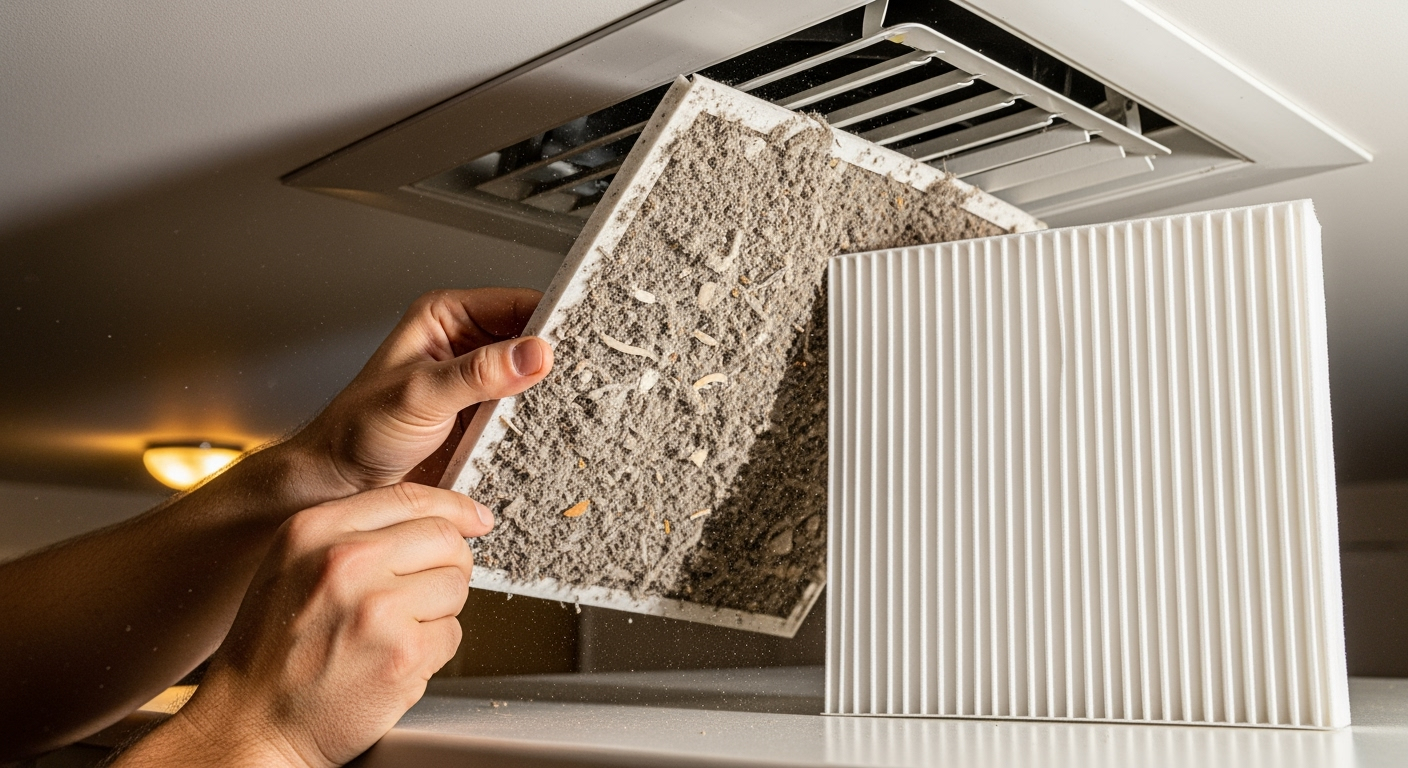
Seasonal Service Requirements
Seasonal air conditioning care ensures that your HVAC system is ready for extreme temperatures without needing emergency repair calls.
**Spring startup procedures** prepare systems for summer demands:
– Clean or replace filters before first use
– Test thermostat operation through complete cooling cycle
– Clear condensate drain lines using wet/dry vacuum
– Wash outdoor condenser coils with garden hose
– Check supply and return vent operation
– Verify condensate pump operation (if equipped)
– Test system operation before peak season demand—call for HVAC service if issues arise
**Fall shutdown procedures** protect systems during winter:
– Final filter cleaning or replacement
– Cover outdoor units (top only, allowing air circulation)
– Shut off power at disconnect switch near outdoor unit
– Clear final debris from around outdoor units
– Document any operational concerns for spring HVAC service call
Annual Professional Service
Annual professional HVAC service calls are crucial for optimal operation and safety, preventing major repair needs.
Professional service addresses complex tasks requiring specialized tools and expertise. Technicians perform comprehensive inspections including electrical testing, refrigerant charge verification, and mechanical adjustments beyond homeowner capabilities during each service call. Service providers throughout Montgomery County and Burlington County report that regular annual service significantly reduces emergency calls.
Professional air conditioning service addresses complex issues that homeowners may miss. Electrical system checks are an essential part of comprehensive HVAC service. Refrigerant circuit care is crucial for a properly functioning air conditioning system. Failure to address coil cleaning during service calls can cause significant efficiency losses requiring repair.
| Service Component | Tasks Performed | Frequency | Impact if Skipped |
|---|---|---|---|
| Electrical System | Test capacitors, contactors, wiring | Annual HVAC Call | Component failure, fire risk, repair costs |
| Refrigerant Circuit | Check charge, test for leaks | Annual Service Call | Poor cooling, compressor repair |
| Coil Cleaning | Deep clean evaporator/condenser | Annual HVAC Call | 30% efficiency loss, repair needs |
| Moving Parts | Lubricate motors, adjust belts | Annual Service | Premature wear, repair calls |
⚠️ **Important:** Never attempt refrigerant handling or electrical component replacement yourself. These require professional HVAC expertise and specialized equipment for safe, legal completion—always call certified technicians.
Never overlook the importance of professional air conditioning service calls to ensure safety and avoid costly repairs.
Common Air Conditioning Problems
Identifying HVAC problems early can often be addressed through proper service before major repair becomes necessary.
Understanding common AC problems helps identify when professional service calls are needed versus simple DIY solutions. Early problem recognition prevents minor issues from becoming major failures requiring emergency restoration services and expensive repair work.
Insufficient Cooling
When your AC runs continuously without reaching set temperature, multiple causes require investigation. Dirty filters restrict airflow significantly, making adequate cooling impossible. Check and replace filters first—this solves many cooling complaints without needing a repair call, especially during humid Lehigh Valley summers.
Regular air conditioning service can help prevent insufficient cooling issues that lead to HVAC repair needs.
Low refrigerant from slow leaks reduces cooling capacity progressively. Systems lose refrigerant gradually through microscopic leaks, eventually impacting performance. Only professionals can legally handle refrigerant, making annual charge checks during HVAC service calls essential for maintaining cooling capacity.
System Won’t Start
Routine air conditioning service can prevent system failures from electrical issues that require emergency repair calls.
Complete system failure often stems from simple electrical issues. Check circuit breakers first—AC systems require dedicated circuits that occasionally trip during power fluctuations common during Mid-Atlantic summer storms. Verify thermostat batteries and settings before calling for HVAC repair.
Capacitor failure prevents compressor and fan motor startup, causing complete system failure despite having power. Failed capacitors account for many HVAC service calls, according to Air Conditioning Contractors of America, emphasizing the importance of professional electrical testing during regular service to avoid emergency repairs.
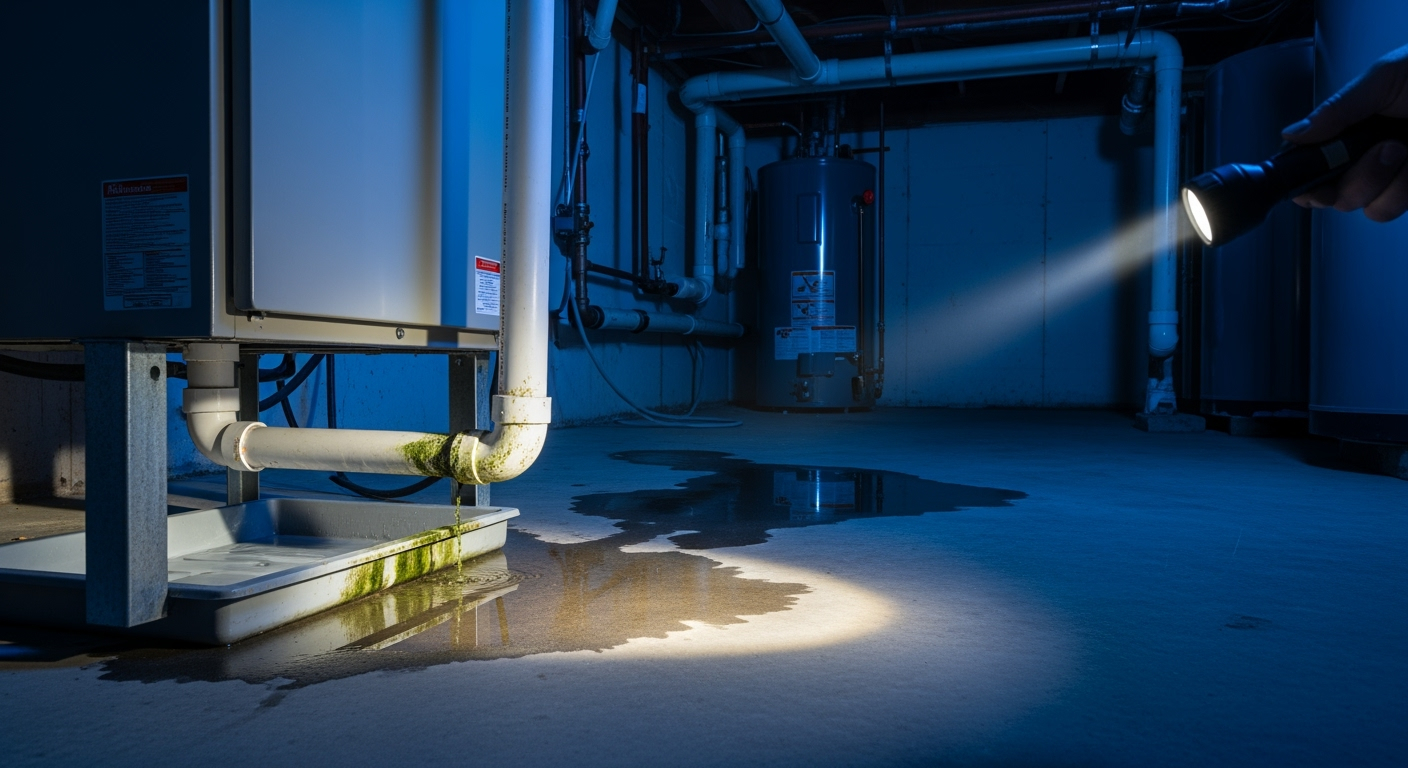
Water Leaks and Drainage Issues
Proper air conditioning service prevents drainage issues that can lead to water damage and expensive repair work.
HVAC systems produce significant condensation requiring proper drainage. Clogged drain lines cause water backup, potentially damaging ceilings, walls, and flooring. Regular drain cleaning during service prevents most water-related AC problems that require repair calls, particularly important in historic Wilmington and Princeton homes with sensitive materials.
Frozen evaporator coils create excessive water when thawing, overwhelming drainage systems. Ice formation indicates airflow restrictions or refrigerant problems requiring professional HVAC diagnosis—call experts immediately. Never chip ice from coils—allow natural thawing to prevent coil damage and costly repairs.
Unusual Noises
Different sounds indicate specific problems requiring varied repair responses:
– **Squealing:** Belt slippage or bearing failure—call for immediate HVAC repair
– **Clicking:** Electrical relay problems or thermostat issues—schedule service call
– **Bubbling:** Refrigerant leaks or moisture in refrigerant lines—urgent repair needed
– **Banging:** Loose components or compressor problems—call for emergency HVAC service
– **Hissing:** Significant refrigerant leak requiring immediate shutdown and repair call
Seasonal HVAC Service Strategies
Incorporating seasonal air conditioning service strategies can enhance overall system health and prevent repair needs.
Strategic seasonal care maximizes HVAC system performance while preventing weather-related damage and repair issues throughout the year.
Spring Preparation
Begin spring service a few weeks before anticipated first use. This timing allows for professional HVAC service scheduling and part replacement if needed. Early preparation avoids the rush when everyone simultaneously needs service calls during the first heat wave that hits the I-95 corridor from Trenton to Wilmington.
Test your system on a mild day when service technicians remain available for non-emergency calls. Running systems during moderate weather provides accurate performance assessment without overworking equipment. Document any concerns for professional HVAC evaluation and potential repair needs.
Summer Optimization
Optimizing your air conditioning care during summer ensures peak HVAC performance and fewer repair calls.
Peak cooling season demands vigilant service attention. Check filters every **2 weeks** during continuous operation, as heavy use accelerates contamination. Monitor condensate drainage daily during humid periods when systems remove maximum moisture—blocked drains require immediate repair.
💡 **Pro Tip:** Set programmable thermostats to comfortable temperatures when home and slightly higher when away. Each degree of increased setpoint can reduce cooling costs while reducing HVAC system wear and repair frequency. This is especially effective during Pennsylvania’s variable spring and fall weather.
Fall Winterization
Proper shutdown protects systems from winter damage that would require spring repair work. Clean systems before storage to prevent mold growth and corrosion during idle months. Cover outdoor units appropriately—only cover the top to prevent debris accumulation while allowing moisture escape.
Proper winterization through air conditioning service prevents damage and repair needs during off-seasons.
Document operational issues noticed during the cooling season for addressing during spring HVAC service calls. Creating service logs helps technicians identify developing problems requiring attention or future installation upgrades.
Winter Protection
Even idle systems need winter attention to avoid spring repair calls. Heavy snow loads damage outdoor units, requiring periodic removal after significant accumulation common in the Pocono region. Ice damming around units causes cabinet corrosion and component damage—ensure proper drainage away from units.
For heat pump HVAC systems operating year-round, winter service includes defrost cycle monitoring and coil cleaning regularly to maintain heating efficiency and prevent repair issues throughout the Northeast’s variable winter weather.
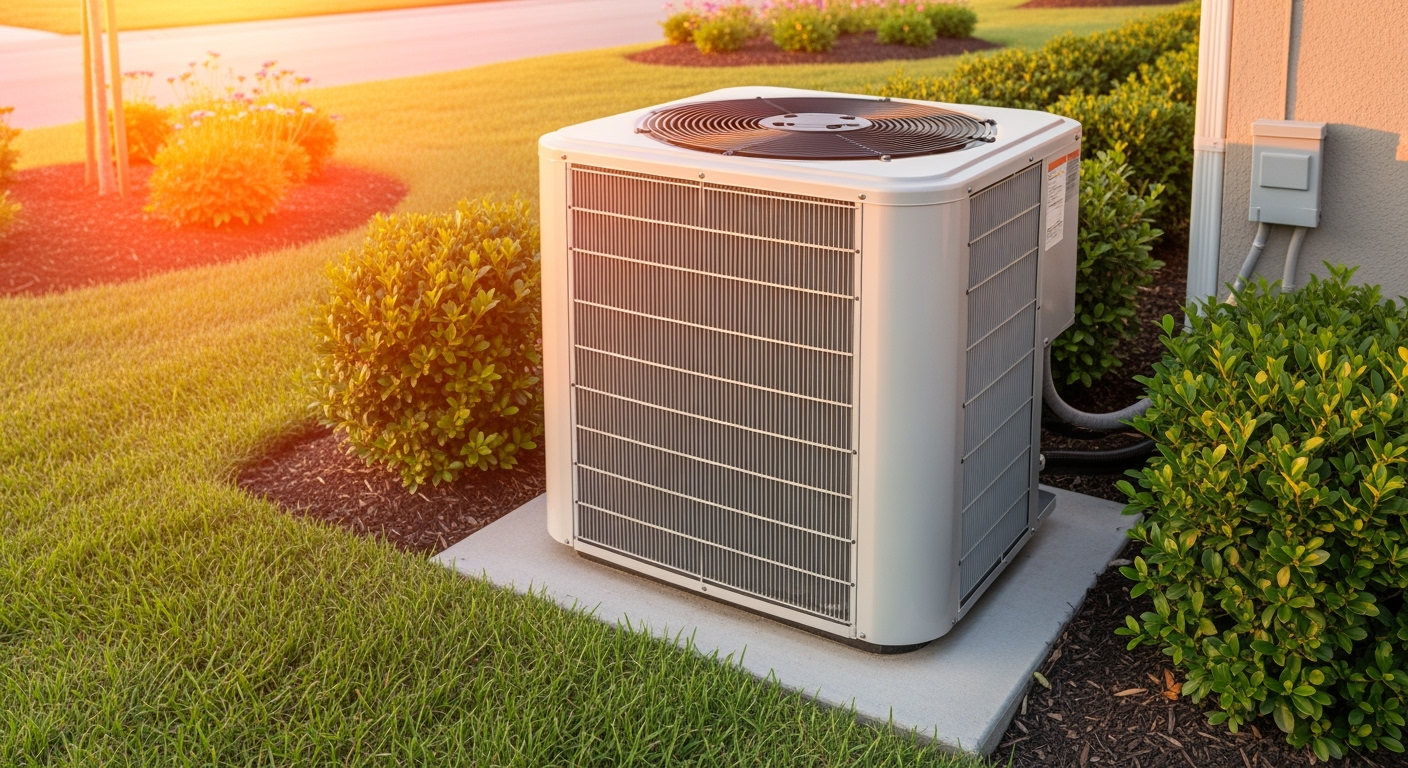
Professional vs DIY Service
Understanding the difference between DIY and professional HVAC service is essential to avoid damage requiring repair calls.
Understanding the boundary between homeowner care and professional HVAC service ensures safety while maximizing system care effectiveness and avoiding unnecessary repair expenses.
Safe DIY Tasks
Homeowners can safely perform basic care that doesn’t involve electrical components or refrigerant handling:
– Filter replacement and cleaning
– Thermostat battery replacement and programming
– Outdoor unit debris removal and cleaning
– Condensate drain line flushing with water or vinegar
– Supply and return vent cleaning
– Visual inspections for obvious repair needs
– Basic coil cleaning with garden hose (power off)—call professionals for deep cleaning
Tasks Requiring Professional HVAC Service
Complex service requires professional expertise, tools, and certifications—always call qualified technicians:
Some air conditioning tasks are best left to professional HVAC technicians to ensure safety and prevent costly repairs.
– Refrigerant handling, testing, and charging
– Electrical component testing and replacement
– Compressor and motor repair or installation
– Deep coil cleaning with chemical treatments
– Ductwork inspection and sealing
– Control board diagnostics and replacement
– Warranty-covered repairs and service—call authorized dealers
⚠️ **Important:** Attempting professional-level repairs risks injury, system damage, and warranty voiding. Refrigerant handling without proper HVAC certification violates federal law with significant penalties—always call licensed professionals.
Investment Considerations
Investing in regular HVAC service protects your system’s value over time and prevents expensive repair calls.
Viewing service as investment protection rather than expense helps justify consistent care. Understanding the financial impact guides HVAC service decisions and installation planning.
Efficiency Return on Service
Professional HVAC service maintains peak efficiency, providing measurable energy savings. Well-maintained systems operating at optimal efficiency save considerably on cooling costs compared to neglected units. For average homes running thousands of hours annually across the humid Mid-Atlantic region, efficiency improvements through service provide substantial savings while avoiding repair expenses.
Preventive service costs a fraction of emergency HVAC repairs. Single compressor failures require major investment, while annual service preventing such failures provides excellent return on service investment over system lifespan before installation replacement.
Property Value Impact
Well-serviced HVAC systems positively impact property values. Home inspections revealing properly maintained systems with service records command higher prices and faster sales. Conversely, neglected systems requiring immediate repair or installation reduce property value and complicate sales negotiations.
Well-documented air conditioning service history can enhance property value significantly and avoid buyer repair demands.
🏠 **Home Tip:** Maintain detailed service records including dates, work performed, and technician notes from every HVAC call. This documentation proves system care during property sales and warranty claims.
Emergency Prevention Value
Emergency AC failures during heat waves create multiple costs beyond repair calls. Temporary cooling solutions, hotel stays, and spoiled food add unexpected expenses. Water damage from drainage failures requires professional restoration services far exceeding preventive HVAC service costs.
Warranty Preservation
Manufacturer warranties require documented professional HVAC service calls for claim validity. Single major component failures covered under warranty justify years of service investment. Extended warranties often require more frequent service calls but provide additional protection for aging systems before replacement installation becomes necessary.
Warning Signs Your AC Needs Service
Recognizing warning signs can lead to timely HVAC service calls and prevent costly emergency repairs.
Recognizing early warning signs prevents complete system failure and expensive emergency repair work. These indicators suggest immediate professional HVAC evaluation is needed—call experts promptly.
Performance Indicators
Declining performance manifests gradually before complete failure requiring emergency repair:
Monitoring performance indicators helps identify when HVAC service calls are necessary.
– Cooling cycles extending beyond normal duration
– Temperature differential between supply and return air below expected range
– Humidity levels remaining elevated despite continuous operation
– Hot or cold spots developing in previously comfortable rooms
– System unable to maintain temperature close to setpoint—call for service immediately
These issues are particularly noticeable during humid Jersey Shore summers or in Lehigh Valley homes with multiple levels.
Physical Warning Signs
Visual and audible changes indicate developing problems requiring HVAC repair:
– Ice formation on refrigerant lines or evaporator coils—call for immediate service
– Water stains or active leaks near indoor units
– Rust or corrosion on system components indicating future repair needs
– Burning smells during operation—shut down and call immediately
– Visible refrigerant oil stains indicating leaks requiring repair
– Excessive vibration or unit movement during operation
Energy Consumption Changes
Rising energy consumption signals the need for immediate HVAC service call to prevent major repairs.
Rising energy bills without usage changes indicate efficiency losses. Systems consuming significantly more energy than previous years need immediate attention—call for professional HVAC assessment. Compare monthly kilowatt-hour usage year-over-year to identify efficiency degradation requiring service or potential installation upgrade.
Advanced HVAC Technologies
Modern technology enhances service effectiveness through monitoring, automation, and predictive analytics, reducing repair frequency.
Utilizing advanced technologies can streamline air conditioning care efforts and prevent emergency repair calls.
Smart Thermostat Integration
Smart thermostats provide service reminders and HVAC system monitoring beyond simple temperature control. Filter change alerts based on runtime hours ensure consistent replacement. System performance tracking identifies efficiency losses before they require repair calls.
Advanced models monitor system cycling patterns, alerting to short cycling or extended run times indicating problems. Some integrate with HVAC service providers, automatically scheduling service calls based on system operation data and preventing emergency repairs.
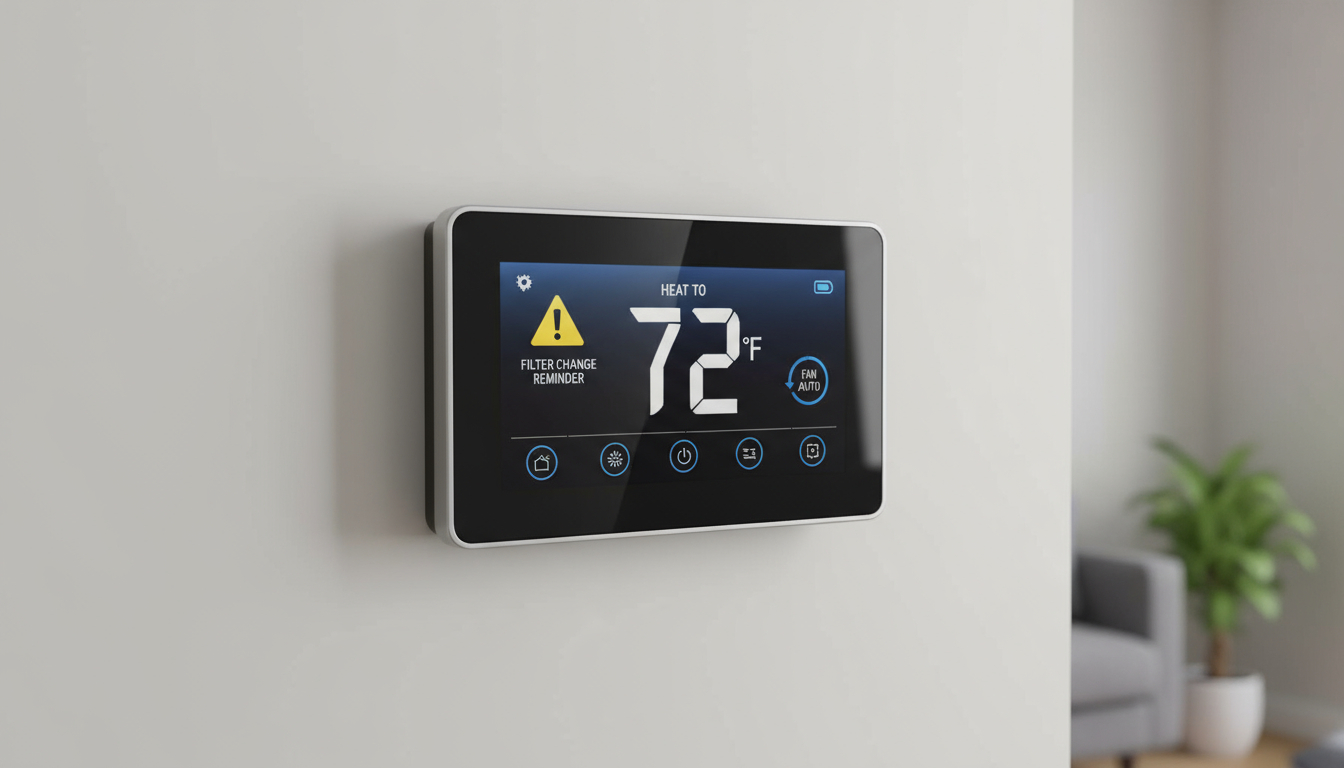
UV Light Systems
UV light HVAC installations can enhance air conditioning performance by improving air quality and reducing cleaning frequency between service calls.
Ultraviolet light installations in air handlers prevent biological growth on evaporator coils. These systems reduce coil cleaning frequency while improving air quality by destroying most mold spores and bacteria, according to EPA indoor air quality guidelines. UV systems require annual bulb replacement during regular HVAC service calls but significantly reduce overall service requirements. Many Camden and Mercer County homeowners find these particularly helpful for managing humidity-related issues.
Condensate Management Systems
Advanced condensate pumps and safety switches prevent water damage from drainage failures that require emergency repair. Float switches shut down systems before overflow occurs, while smart pumps alert to blockages requiring attention. These systems prevent water damage requiring emergency commercial restoration services—call for installation options.
Service Documentation and Records
Maintaining detailed records of HVAC service calls can ensure optimal system performance and warranty protection.
Systematic record-keeping maximizes service effectiveness while protecting warranty coverage and property value through installation lifecycle.
Creating Service Logs
Document every service activity including dates, tasks performed, and observations from each HVAC call. Note filter types and change intervals, professional service reports, and any unusual operations. Digital logs with phone photos provide visual documentation of system condition over time between professional service calls.
Service History Value
Comprehensive service records prove consistent care during warranty claims, property sales, and insurance claims. Detailed histories help technicians identify recurring problems and wear patterns affecting system reliability during future HVAC calls. Insurance companies may provide coverage benefits for documented preventive service programs with regular professional calls.
Frequently Asked Questions
How often should I change my AC filter during peak cooling season?
During peak cooling season, check filters monthly and replace when visibly dirty. Homes with pets, high dust, or allergies require changes every 2-3 weeks. Running your AC continuously demands more frequent filter changes to maintain proper airflow and efficiency, preventing system strain and potential repair calls to HVAC professionals.
Can I handle AC service myself or should I call professional HVAC technicians?
While homeowners can handle basic tasks, professional HVAC service calls are crucial for optimal performance. Homeowners can safely handle filter changes, outdoor unit cleaning, and visual inspections. However, professional service is essential for electrical testing, refrigerant handling, and deep coil cleaning. Annual professional HVAC calls catch problems you might miss and maintain warranty coverage while ensuring safe, legal compliance with refrigerant regulations.
What are the warning signs my AC needs immediate professional repair service?
Call for HVAC repair service if you notice ice on refrigerant lines, water leaks near units, unusual noises like squealing or hissing, burning smells, or inability to maintain set temperature. Systems running continuously without cooling, frequent circuit breaker trips, or energy bills increasing significantly also indicate professional repair attention is needed immediately—don’t delay the call.
When is the best time to schedule annual HVAC service calls?
Schedule annual HVAC service calls in early spring, ideally 2-3 weeks before you expect to start using your AC regularly. This timing allows for any necessary repairs or installation work before peak season demand. Early scheduling ensures technician availability and gives you time to address any issues discovered during inspection without emergency rush charges—call early to secure your appointment.
How long do different AC system types typically last with proper HVAC service?
With proper HVAC service calls, central AC systems last 15-20 years before replacement installation, ductless mini-splits 20-25 years, window units 8-10 years, and portable units 5-10 years. Regular service can extend these lifespans by 40%, while neglected systems often fail at half their expected lifespan, requiring premature replacement installation and increased repair costs.
Will skipping annual HVAC service really void my AC warranty?
Yes, most manufacturers require documented annual professional HVAC service calls to maintain warranty coverage. Skipping service can void your warranty, leaving you responsible for repairs that would have been covered. Keep all service records and receipts from every professional call as proof of compliance for any warranty claims that arise after installation.

